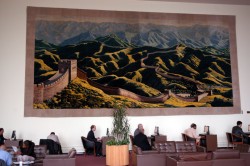Here I am in a New York hotel room… I have left my job, my home, my friends for a long journey back to New Zealand via NYC. How come? I got a new job. Here’s a couple of email postings from the past couple of days starting with the ‘eulogy’ by my boss…
From: “Steve Goose”
Sent: Thursday, June 22, 2006 5:38 AM
To: ab@list.icbl.org>,
Subject: [ab] Mary W. to NZ
Please forgive duplicate postings.
As most of you know, tomorrow is Mary Wareham’s last day at Human Rights Watch. After eight years years in Washington at HRW running the landmines show, and several years before that working on the ICBL and coordinating the US Campaign to Ban Landmines while at the Vietnam Veterans of America Foundation, she will be returning to New Zealand to become the advocacy director for Oxfam New Zealand. The loss to the landmine movement is incalculable, but Mary no doubt will be busy making the world a better place in many other spectacular ways.
It is literally impossible to overstate Mary’s contributions to the global effort to ban antipersonnel mines. Even before coming to HRW, she was an indispensable part of the campaign that resulted in the 1997 Mine Ban Treaty–it exists in no small measure because of her work–and certainly a huge chunk of the Nobel Peace Prize awarded to the ICBL in 1997 belongs to Mary. At HRW, she created the unprecedented Landmine Monitor initiative from scratch, one of the more notable NGO achievements in any field in recent years. As “global coordinator” of the LM, she made it work, building a network of 122 monitors in 95 countries, coordinating, organizing, cajoling, researching, writing, editing, fundraising, reporting, and on and on, while also doing the press work and advocacy that maximize LM’s impact. (Did I mention in her “spare time” she made an award winning documentary on the landmine issue?) Last but not least, she made me look good on more occasions than I can count; I have no doubt that she increased the effectiveness of my work and HRW’s work on mines many times over. I will miss her terribly, as will all of us in the mine ban movement, but I look forward to seeing what she comes up with next! Please wish her well in her new endeavors.
Steve Goose
Executive Director, Arms Division
And this is what I had to say…
Mary Wareham wrote:
This is my last day in the office so I’ll try and be brief and please, no more tributes. I’m off this HRW email in an hour or so and won’t be able to read them! But thanks for all your kind words. I feel like I’m retiring after 40 years!!! Instead of looking back, I’d like to say a few words about what I’ll be doing as Advocacy Director at Oxfam New Zealand…
I start this job on Monday, not in NZ, but in New York where I will attend the Small Arms Review Conference as a member of the NZ official delegation since some governments are still trying to lock out the NGOs. As many of you know, Oxfam has been engaged in the “Control Arms” campaign for a while now and the outcome of this conference will help determine the future of this engagement.
By 10 July, I should be back in New Zealand working out of the capital Wellington where I grew up. Oxfam NZ carries out relief and development in the Pacific (mainly Melanesia) and Southeast Asia (esp. Indonesia). The group also engages in advocacy on fair trade, debt relief, increasing aid levels, ensuring access to education and clean drinking water, and other pressing concerns. I have some things I’d like to see them do more on, such as universalization of the Mine Ban Treaty in the region, endorsing the Cluster Munition Coalition, advocating for disability rights and the forthcoming Convention, and pressing on human rights concerns esp. immigrant/refugee rights.
Here’s my new email: mary@oxfam.org.nz I can’t check it until 10 July though! So please use the film address: mary@nspfilms.org
So much to say, so many people to thank, but so much to clear/clean up and so little time so … I’m outta here! Lots of love & g’bye!
Mary Wareham
Senior Advocate, Arms Division (until 23 June)
 The NGOs will still get to deliver their statements tomorrow morning after which inexplicably a time-wasting session on assistance and cooperation has been allocated for the rest of the day. The NGOs unfortunately intend to provide about 16 speeches to the plenary followed by an unknown number of gun lobbby statements including the National Rifle Association, which has gotten into the meeting as a “NGO.”
The NGOs will still get to deliver their statements tomorrow morning after which inexplicably a time-wasting session on assistance and cooperation has been allocated for the rest of the day. The NGOs unfortunately intend to provide about 16 speeches to the plenary followed by an unknown number of gun lobbby statements including the National Rifle Association, which has gotten into the meeting as a “NGO.”






